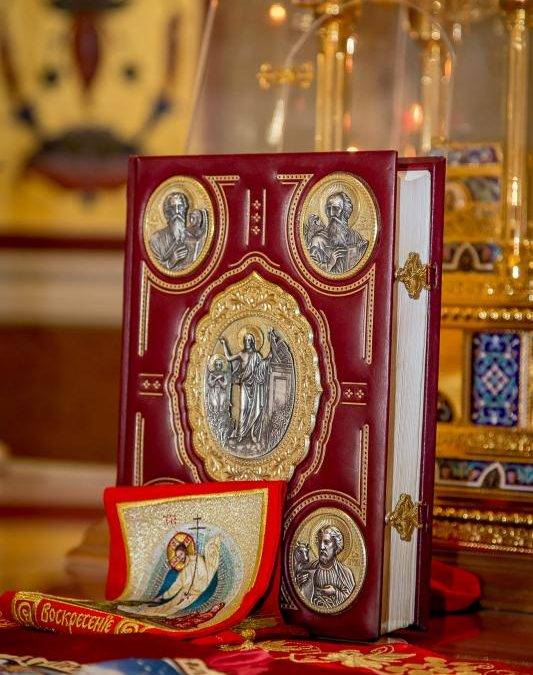
Holy Scripture and Great Lent
The prayer of the Church is always biblical - ie. expressed in the language, image and symbols of the Holy Scriptures. If the Bible is the Divine Revelation for man, it is also man's inspired response to that Revelation and the form and content of his prayer, praise and worship.
For example, thousands of years have passed since the psalms were composed. Even today, when a person feels the need to express repentance, the excitement of his entire being and the appeal of Divine mercy, he finds the appropriate expression of repentance in the psalm, which begins with "Have mercy on me, God!..." Every situation in which a person can present himself before God , to the world and to other people, from the all-encompassing joy of God's presence, to the boundless despair of exile, sin and alienation, found its perfect expression in the unique Book, which always constituted the daily food of the Church, the meaning of its worship and self-building.
During Great Lent, the biblical dimension of worship is especially emphasized. It can be said that forty days of fasting is the return of the Church to the situation of the Old Testament - to the time before Christ, the time of repentance and expectation, the time of "salvation history", which moves towards its fulfillment in Christ. This return is necessary because we - although we belong to the time after Christ, know Him and are "baptized in Him" - constantly fall away from the new life that we received from Him, which means we fall back into the "old" time. On the one hand, the Church is already "at home" because it is "the grace of Jesus Christ, the love of God the Father and the community of the Holy Spirit". On the other hand, as a traveler, she is also "on her way" which is long and difficult - in the direction of the fulfillment of everything in God, the return of Christ, and the end of all time.
Great Lent is the time when this second aspect of the Church, its life as expectation and path, is realized. It is precisely in this aspect of it that the Old Testament acquires its full significance; as a book of prophecies that were fulfilled, but also a book of everything opened "on the way" to the Kingdom of God.
The use of the Old Testament in worship during fasting is determined by two main principles: reading the Psalter twice and lectio continua, i.e. complete reading of the three books - Genesis, the prophet Isaiah and Stories.
Psalms have always occupied a unique place in Christian worship. The Church sees in them not only the best, but the most adequate and perfect expression of man's prayer, repentance, glorification and praise, and also the true icon of Christ and the Church painted in words, the revelation in the Revelation. For the Holy Fathers, says one interpreter of their works, "Christ himself and His Church pray (weep) and speak in this Book". From the very beginning, the Psalms formed the basis of the Church's prayer and its "natural language". They were used in worship as "fixed psalms", i.e. as permanent material for all daily services: "Evening Psalms" (Ps. 104) - at vespers; at matins, six psalms (Ps. 3, 38, 63, 88, 103, 143), and psalms of thanksgiving (Ps. 148, 149, 150); groups of three psalms in the Hours, etc. From the Psalter, Prokymenes, verses for hallelujahs for all holidays and celebrations throughout the year were chosen. And finally, the entire Psalter, divided into twenty parts or Catechisms, is sung in its entirety every Sunday at vespers and matins. This third type of use of the Psalter is doubled during Lent; The Psalter is sung not once, but twice every Lent, and a part of the Psalter is included in the Third and Sixth Hours.
"Continuous reading" of Genesis, Isaiah and Stories has its origin from the time when fasting was a time determined by the Church before receiving the Holy Sacrament of Communion, when the services were predominantly of a catechetical character, and dedicated to the instruction of catechumens. Each of the three books corresponds to one of the three basic aspects of the Old Testament: the history of God's activity, creation and moral teachings. The book of Genesis is the "framework" of the Church's faith. It contains the story of the creation, the fall and, finally, the promise and beginning of salvation through God's covenant with His chosen people. He tells us the three basic dimensions of the Church's faith in God as Creator, Judge and Savior. It reveals the basics of the Christian concept of man created "in the image and likeness of God", who fell away from God and man, who remained an object of God's love and care and, finally, salvation. It reveals the meaning of history as the history of Salvation, which leads to Christ and finds fulfillment in Him. The Book of Genesis reveals the secret of the Church through the image and reality of the People of God, the Covenant, the Ark of the Covenant, etc.
Isaiah is the greatest of all prophets. Reading from his book during Lent means that through the suffering and sacrifice of Christ, the great secret of salvation was rediscovered.
Finally, the book of Stories is the epitome of the moral teachings of the Old Testament, the moral law and wisdom. If he does not accept them, man cannot understand his alienation from God, he cannot even hear the good news of forgiveness, through love and grace.
Sections from the aforementioned three books are read during Lent every day - from Monday to Friday: Genesis and Story at Vespers, and Isaiah at the Sixth Hour. Although Lent has long since ceased to be the catechumenal age of the Church, the basic purpose of the aforementioned readings has retained its original significance. Our Christian faith requires us to return to biblical sources and foundations every year. The Bible is not a collection of dogmatic "suggestions" to be accepted and memorized forever.
She is the living voice of God who, again and again, speaks to us, introducing us ever deeper into the inexhaustible wealth of his wisdom and love. There is no greater tragedy in our Church than the almost complete ignorance of the Holy Scriptures on the part of its members, and what is worse, the really complete indifference to it. What for the Fathers of the Church and Saints represented infinite joy, interest, spiritual and intellectual growth, today for many Orthodox Christians is an outdated text, without significance for their lives. Therefore, we should hope that, with the rediscovery of the spirit and significance of Great Lent, the Holy Scriptures will be rediscovered as true spiritual food and communion with God.
Taken from the book Great Lent by Archpriest Alexander Schmemann
PHOTOS
RELATED ARTICLES
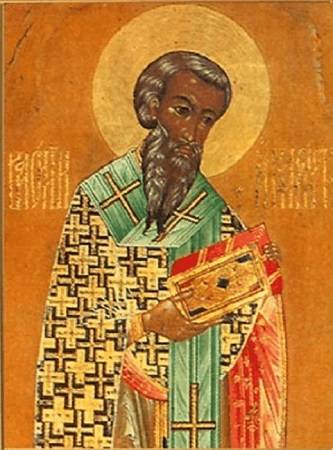
Calendar for May 9 His Homilist Basil of Amasia
Licinius, the son-in-law of Emperor Constantine, whose sister he had married,...
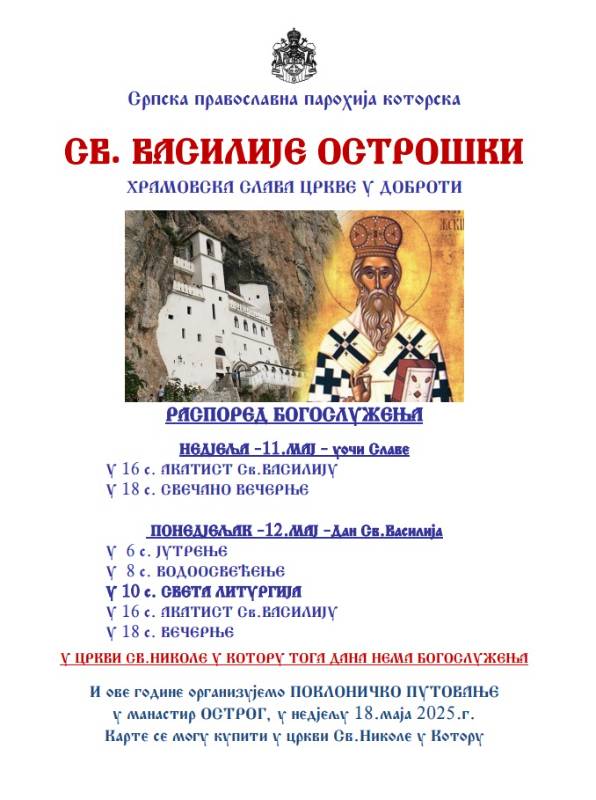
WORSHIPS ON THE OCCASION OF ST. VASILIJE OSTROŠKI
SERBIAN ORTHODOX PARISH OF KOTOR ANNOUNCES WORSHIPS ON THE OCCASION OF ST....
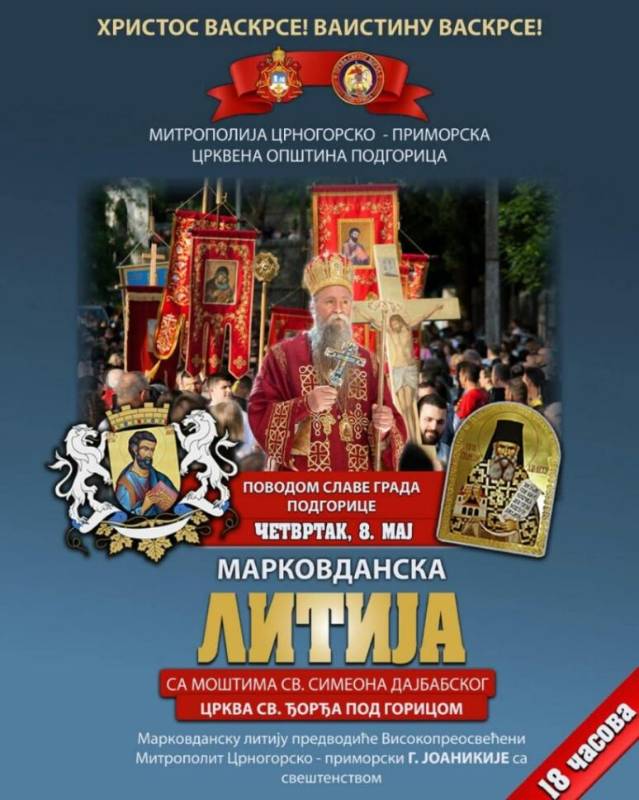
St. Mark's Day procession in Podgorica
On the occasion of the celebration of the city of Podgorica, the...


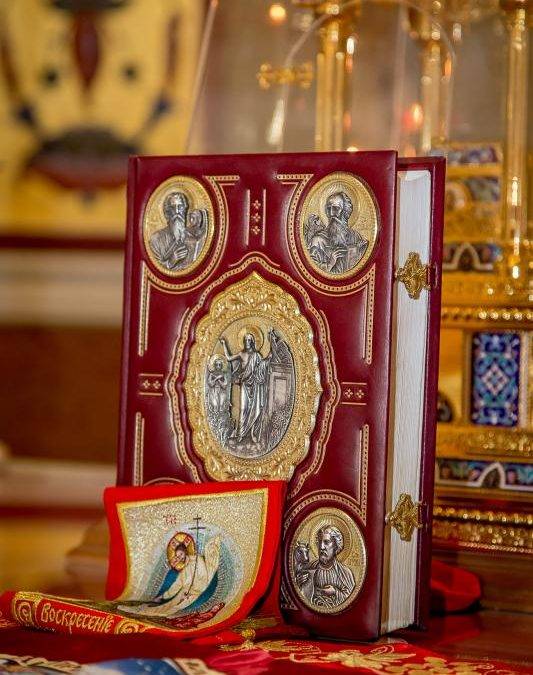

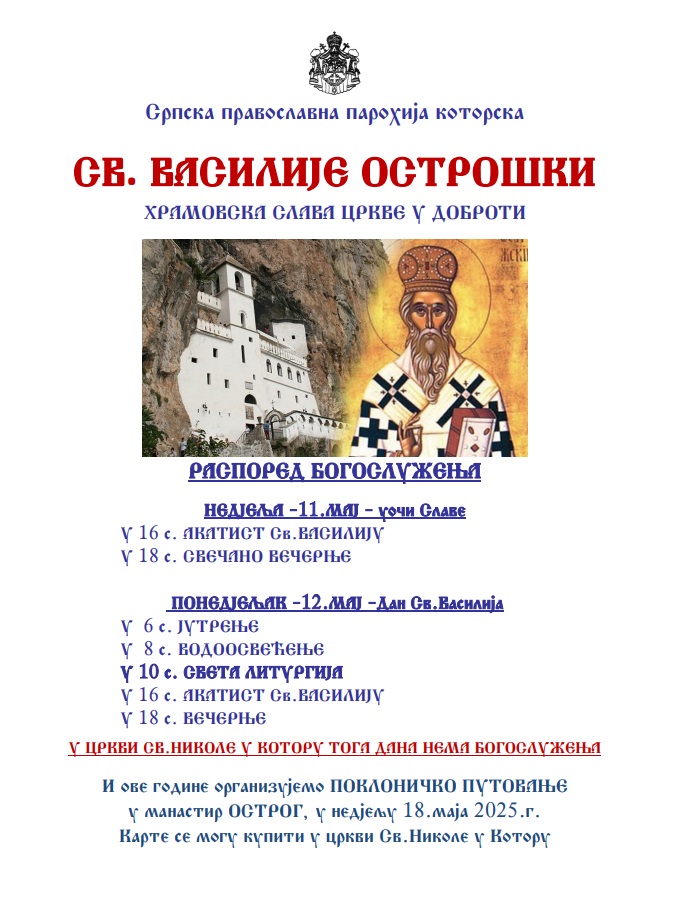
.png)